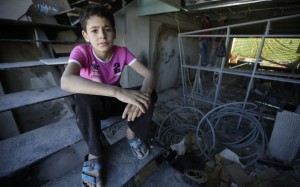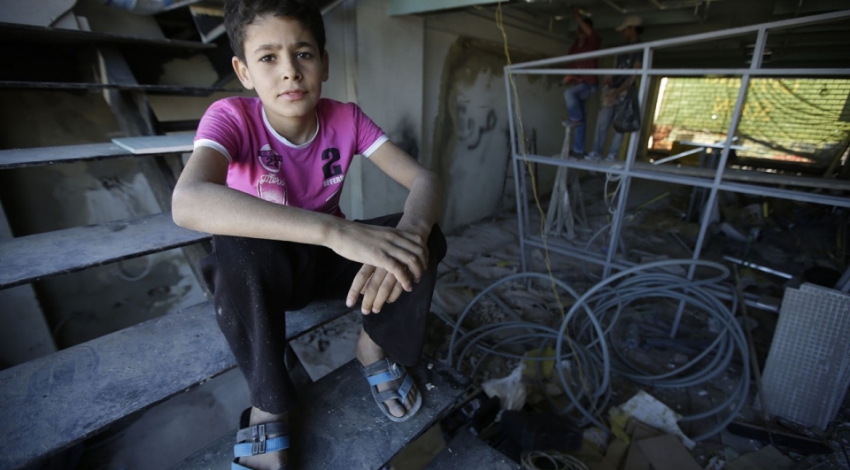[caption id="attachment_85108" align="alignright" width="180"]
 Syrian boy Toufic al-Hajj Hassan, 13, from the village of Taybet al-Imam in the countryside of the Syrian city of Hama, poses for a picture at a construction site in the Lebanese capital Beirut on Oct. 25, 2013, where he works to provide income for his family. Toufic fled Syria five month ago with his parents and settled in the northern Lebanese city of Tripoli.[/caption]
Syrian boy Toufic al-Hajj Hassan, 13, from the village of Taybet al-Imam in the countryside of the Syrian city of Hama, poses for a picture at a construction site in the Lebanese capital Beirut on Oct. 25, 2013, where he works to provide income for his family. Toufic fled Syria five month ago with his parents and settled in the northern Lebanese city of Tripoli.[/caption]ADOUS, Lebanon � Mahmoud used to be a mechanic in the Syrian town of Qusair. Today he�s using those skills to fix a truck that belongs to a friend of his landlord�s. Helping him are his 12- and 15-year-old nephews. It�s a Tuesday afternoon and they�re not in school, because there is no school they can attend.
Thirty-year-old Mahmoud (whose name has been changed to protect his identity) finds work wherever he can. So do his children and his nephews. They�re all Syrian refugees who arrived in Lebanon six months ago with�not much more than the clothes they were wearing. Mahmoud�s family and his brother�s family live amid a few scrawny cherry and apricot trees on a windswept patch of a farmer�s field near the Bekaa Valley city of Baalbak, across the border and about 35 miles from Qusair. The stark camp looks like a scene out of John Steinbeck�s Depression-era tale �The Grapes of Wrath,� with a mangy dog guarding the plot�s perimeter, marked by a rusting barbed-wire fence.
Mahmoud�s daughter, Hamra, doesn�t attend school either. She stands near her mother and looks on as her cousins work on the truck. She wants to show visitors that she has contributed to the family�s survival as well. Holding up her hands, she demonstrates how she weaved dried tobacco into bunches last fall. She was working with her family � her mother, cousins and 7-year-old sister were all employed by tobacco farmers in the area.
�I used to sew the leaves like this,� she says proudly, weaving her hands together. �I worked for three days.�
Hamra is 5 years old. Her family was given the equivalent of $2 for every three hours she worked.
�Yes,� says her mother, a 24-year-old who calls herself Um Omar. �They taught her how to sew, and she worked with us. I know it�s very difficult, but what can we do?�
�We need to eat,� says Mahmoud, who is embarrassed but honest when asked why his 5-year-old daughter is working. �In Syria she would be in school. But here, what can we do?�
�It�s a way to help (families) to get bread, food,� says Abu Mohammad, the farmer who owns the land the families are living on. �They came with nothing. They get basically nothing from the U.N., and there�s not much help for them elsewhere. So it helps them when the children work, to pay for some expenses.�
[caption id="" align="alignnone" width="672"]
 A Syrian refugee boy Mahmoud, 15, cleans fish for tips in a shop next to his home in an underground shelter where he lives with his family, in Lebanon. Mahmoud hasn't been to school in 3 years. The boy is among a growing number of Syrian refugee children who are fast becoming primary providers for families who lack resources for basic survival, according to an UNHCR report.
A Syrian refugee boy Mahmoud, 15, cleans fish for tips in a shop next to his home in an underground shelter where he lives with his family, in Lebanon. Mahmoud hasn't been to school in 3 years. The boy is among a growing number of Syrian refugee children who are fast becoming primary providers for families who lack resources for basic survival, according to an UNHCR report.Shawn Baldwin/UNHCR/AP[/caption]
Five-year-old Hamra is one of the thousands of Syrian children working to help their families pay for the basics: food, shelter and transportation. An NGO assisting refugees in this area says that 40 percent of the children from the 7,500 refugee families in and around Baalbak have worked at some point. And the United Nations child advocacy unit, UNICEF, estimates that approximately 350,000 Syrian refugee children do not attend school. That�s 70 percent of the 500,000 children in the country. UNICEF Child Protection Officer Abir Abi Khalil says this sets children up for being exploited by employers looking for cheap labor.
Hamra, her siblings and cousins can�t attend school because the public school in Baalbak, which is free, is already full. And the private school � where the family would have to pay for fees, books and transportation � is too expensive. Most of the Syrian refugees in Lebanon are in the same situation. Abi Khalil says that even if all Lebanon�s public schools were to run schooldays in two shifts, there would still not be enough resources to serve all the Syrian children.
�The more you have children outside of school, the more likely they are going to be working,� she said. �And as long as these children do not have access to schools, they are expected to go to work.�
UNICEF has helped refugees to establish localized learning programs near the more than 1,500 locations where Syrians have settled in Lebanon so children can learn or retain math, reading and writing skills. But there are few such programs, and the burden grows every day. More than 13,000 Syrians arrived in Lebanon in the third week of January alone, according to the U.N., and more than 41 new tented settlements sprang up in the Bekaa Valley in the first three weeks of this year, bringing the total to 450.
Abi Khalil says many Syrian refugees living in tented communities are families headed by women, since the men are either fighting in Syria, injured or dead. The women come from conservative, rural areas where they traditionally do not work. Many must also care for other children, among additional duties like preparing meals.
�They�ve exhausted their savings, if they brought any with them,� says Abi Khalil. �So the child is the only breadwinner in the family. They are relying on their children to work.�
In Lebanon, it�s now common to see young Syrian children at jobs that a few years ago would have been done by older teenagers or adults. Ten-year-old boys stock grocery shelves and deliver food. Children barely into their teenage years work full time packaging diapers at factories or picking potatoes in fields. And 5-year-old girls, like Hamra, pick and weave tobacco for farmers who will sell it to Lebanon�s state-owned tobacco monopoly to make the national Cedar brand cigarettes.
The Lebanese government has signed international labor treaties barring work for children under the age of 15. But the government has its mandate in the formal sector of the economy � not to mention that it is weak and ineffective.
�The government can only enforce the formal sector, and much of the child labor is occurring in the informal sector,� says UNICEF�s chief of communications, Soha Boustani. �Even if the abuse was taking place in the formal sector, the government doesn�t have resources to do the monitoring.�
Children are paid far less than laborers undertaking the same jobs would have been paid prior to the Syria crisis.
Abu Mohammad, the farmer, says that before the refugee crisis, farmers paid about $10 per five hours of work to the seminomadic Bedouin migrant workers who would perform the farm labor here in Lebanon�s fertile agricultural heartland, the Bekaa Valley. Back then, no one younger than 15 would do the work.
Now, with an estimated 900,000 refugees in the country, more than 50 percent of them children, the influx of potential workers has driven the price of labor down to $2.75 or $3.50 for five hours of work. Overtime is $2 for another two or three hours.
Mahmoud, Hamra�s father, says the farmers in Lebanon prefer children to adults because child laborers are more efficient, can more easily be hired at a moment�s notice and are cheaper.
�A man is $7 per day, a child is $3.50 to $4 per day,� he says. �There are children who would work the whole day for $3.50 � just to buy bread.�
Last fall, Hamra�s 7-year-old sister, Ayaa, was one of those children who worked from 7 a.m. to 3 p.m., weaving tobacco for meager compensation.
�They ask her to work because she�s small and they don�t pay her much,� her mother says. �So I let her go. She complains about having a pain in her back, because she�s sitting the whole time. She needs to move, she needs to play, but she�s just sitting.�
The farmer, Abu Mohammad, who lets the refugees live on his land for free, says the lower wages he�s paying laborers don�t mean greater profits from his tobacco crop. At the same time, he says the revenues he receives from the sale of his tobacco have not declined. He sells it at about the same rate as three years ago, around $7 per kilo. Still, he denies that he and other farmers are benefiting from the cheap labor � especially child labor � although it seems evident that if he isn�t, other farmers in the area are.
Abu Mohammad says the Syria conflict has hit Lebanon�s farmers hard as well. �We used to sell a lot to Syria, Jordan and Iraq, through Syria, but now the roads are blocked, so the market itself is less,� he said. They aren�t selling as much of their produce, he says, since Lebanon�s exports through Syria have been severely curtailed because of the conflict, and transporting Lebanese goods through the war-torn country costs much more than it did before.
�Everything is going a step back, it�s not progressing."
By Al Jazeera
The Iran Project is not responsible for the content of quoted articles.











